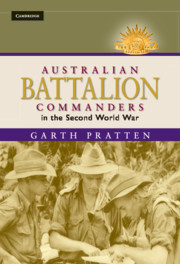Book contents
- Frontmatter
- Dedication
- Epigraph
- CONTENTS
- List of maps and figures
- Military symbols on maps
- ACKNOWLEDGEMENTS
- NOTES ON THE TEXT
- List of abbreviations
- INTRODUCTION
- CHAPTER 1 ‘COMPLETELY UNTRAINED FOR WAR’
- CHAPTER 2 THE FOUNDATIONS OF BATTALION COMMAND
- 3 ‘WE WERE LEARNING THEN’
- CHAPTER 4 DESERT EPILOGUE
- CHAPTER 5 VICTIMS OF CIRCUMSTANCE
- CHAPTER 6 ‘NO PLACE FOR HALF-HEARTED MEASURES’
- CHAPTER 7 ‘THERE IS NO MYSTERY IN JUNGLE FIGHTING’
- CHAPTER 8 ‘EXPERIENCED, TOUGHENED, COMPETENT’
- CONCLUSION
- APPENDIX 1 THE DEMOGRAPHICS OF AUSTRALIAN BATTALION COMMANDERS
- APPENDIX 2 PERIODS OF COMMAND
- NOTES
- BIBLIOGRAPHY
- INDEX
CHAPTER 8 - ‘EXPERIENCED, TOUGHENED, COMPETENT’
1945
Published online by Cambridge University Press: 18 December 2014
- Frontmatter
- Dedication
- Epigraph
- CONTENTS
- List of maps and figures
- Military symbols on maps
- ACKNOWLEDGEMENTS
- NOTES ON THE TEXT
- List of abbreviations
- INTRODUCTION
- CHAPTER 1 ‘COMPLETELY UNTRAINED FOR WAR’
- CHAPTER 2 THE FOUNDATIONS OF BATTALION COMMAND
- 3 ‘WE WERE LEARNING THEN’
- CHAPTER 4 DESERT EPILOGUE
- CHAPTER 5 VICTIMS OF CIRCUMSTANCE
- CHAPTER 6 ‘NO PLACE FOR HALF-HEARTED MEASURES’
- CHAPTER 7 ‘THERE IS NO MYSTERY IN JUNGLE FIGHTING’
- CHAPTER 8 ‘EXPERIENCED, TOUGHENED, COMPETENT’
- CONCLUSION
- APPENDIX 1 THE DEMOGRAPHICS OF AUSTRALIAN BATTALION COMMANDERS
- APPENDIX 2 PERIODS OF COMMAND
- NOTES
- BIBLIOGRAPHY
- INDEX
Summary
By the beginning of 1945 the AMF had been at war for more than five years and committed to active operations for four. In its ethos, structure and proficiency it bore all the hallmarks of a long-established professional army. The men commanding its battalions were more experienced and more thoroughly trained than they had been at any time since 1939. As Peter Stanley has pointed out, this was a force that was among the best in the world – and it knew it. Stanley was referring specifically to the original units of the 2nd AIF, but his remarks are equally applicable to the operationally experienced battalions of the militia, particularly those of the 4th, 8th and 15th Brigades. Although popularly lauded for its amateur virtues, veterans of the AMF of 1945 have in fact spoken of its professionalism. In his foreword to Nothing Over Us, the history of the 2/6th Battalion, Frederick Wood recalled the words of a senior Australian officer: ‘You are not professional soldiers but you are professional men of war.’ Asked to expand on his description of the 2/1st Battalion in 1945 as a ‘professional’ force, Paul Cullen replied: ‘We were a very experienced, toughened, competent army, with a wonderful team of company commanders and platoon commanders…It was a marvellous team to be the captain of.’
Cullen's words highlight one of the great strengths of the AMF by this point in the war: the insight, trust and mutual respect that underlay many command relationships, both between battalion and brigade and within the battalions themselves. These relationships were the product of shared training, ethos and experience and, in many cases, the type of firm and genuine friendships that are the product of a common ordeal. Demonstrating the main weakness of any human organisation, however, some command relationships in the AMF continued to be undermined by personal animosities, suspicions and idiosyncrasies as they had been since 1939.
- Type
- Chapter
- Information
- Australian Battalion Commanders in the Second World War , pp. 235 - 269Publisher: Cambridge University PressPrint publication year: 2009



